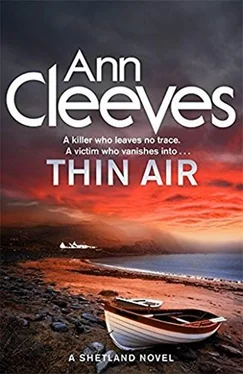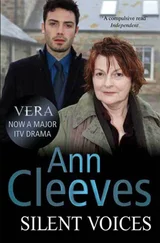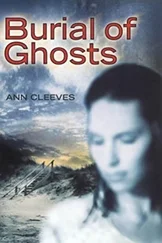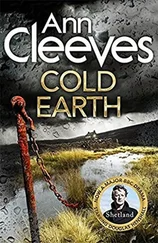‘Of course, Jimmy. That’s the work that you do. Just give me a moment.’ She rolled the dough into a ball, lifted it into a cream china bowl and covered it with a clean tea towel, before setting it on the Rayburn. He wondered if she always answered for the two of them. ‘Do you want tea, or are you swimming in it?’
‘I’m fine.’ He sat with her at the table.
She smiled. ‘So, drowning in tea already, Jimmy. The Shetland way.’
‘How well did you both know Eleanor Longstaff?’
‘We’d met her a few times.’ Grusche still seemed to do the talking for them both. ‘In Durham, when Lowrie was there. And more recently when they were all living in London. They were good friends, I think. They were all at Lowrie’s wedding in Kent a few weeks ago and Eleanor was one of the bridesmaids. Such a bonny young woman. She almost stole the show.’
‘What made your son decide on an English university?’ For many Shetlanders Glasgow or Stirling seemed enough of an adventure.
‘Me!’ She grinned. ‘I’d always brought him up to believe that there was a big wide world out there for him to explore. And I’m ambitious for my son. You know these women with only children, Jimmy – how ferocious we are on their behalf! I’d planned for him to go to Oxford or Cambridge, but he thought he might be out of his depth there. Durham was a compromise.’
And George? Perez wondered. What did he make of having his only son so far away?
‘What did you think of Eleanor Longstaff?’
‘I liked her! She was full of fun, a performer. One of those people who are always acting. Entertaining. I enjoyed talking to her about art and politics.’ She paused. ‘But I was glad when Lowrie went for Caroline.’ Another pause. ‘Some people are like a rich chocolate cake, don’t you think, Jimmy? You’d only enjoy them in small mouthfuls. I could never imagine Eleanor setting up home in Unst.’
‘But you think Lowrie and Caroline will come back?’
‘Maybe. We’d like that, wouldn’t we, George?’
The man smiled from his chair. ‘Yes, it’d be good to see our grand-bairns growing up. And to have some help on the croft.’
‘We could make no assumptions about either of those things.’ Grusche’s voice was sharp. ‘Not about children, or what Lowrie and Caroline would do when they were here. But I missed him when he left home and it would be wonderful to see him back.’
‘Was there ever a possibility that Lowrie would settle with Eleanor then? Did he go out with her?’ Perez hadn’t been told about that. Did it mean the English people were keeping information from him? Or had it happened so long ago – a brief student fling – that they’d forgotten about it? Perhaps Shetlanders had longer memories than other folk.
Grusche shrugged. ‘He went out with Eleanor a couple of times. She was an attractive woman.’
George stood up and leaned his back against the range. ‘Yon woman broke his heart,’ he said. ‘We need to be honest with Jimmy. He’ll find out these things anyway. It’s impossible to keep a thing like that hidden.’
‘Lowrie was nineteen,’ Grusche said. ‘A boy. Away from home for the first time. It’s not surprising that he took rejection so seriously.’
‘But he came home threatening to leave the university,’ George said. ‘You even thought he might kill himself! You called her a witch.’
‘I was overreacting,’ Grusche said. ‘And so was he. He found Caroline, who is sensible and not given to games.’
‘But that was the sort of woman Eleanor was, Jimmy.’ It seemed to Perez that George thought carefully about every word before he spoke it, that he was trying to convey a special message hidden behind the words. ‘She was a generous person and warm and funny. But she wasn’t very kind. She wasn’t aware of anyone’s pleasure but her own, and she was always after excitement.’
Perez looked at the man. He thought George had been brooding about all this since Eleanor Longstaff’s body had been discovered. ‘Is there anything else you think I should know?’
The man hesitated and then he shook his head. ‘No. But when I heard that someone had killed her, I wasn’t surprised.’
Willow Reeves watched the hearse from Lerwick drive away with the body, past Sletts, until it disappeared behind the Meoness community hall, where two days ago the victim had been dancing. From this distance the vehicle looked like a shiny beetle, and sunlight bounced from its black paint. Eleanor Longstaff would be in the boat south tonight and in Dr Grieve’s Aberdeen mortuary tomorrow.
She turned to look at Vicki Hewitt at work. So far the crime-scene manager had found little to excite her close to where Eleanor’s body had been lying. The ground was too dry for footwear marks and the heather grew right to the edge of the loch. No mud or sand. When they’d lifted the woman from the water they’d seen the blow to the head, just as James Grieve had predicted. There’d been bloodstains on the back of the expensive silk dress; spatters that had remained even though the body had been underwater for some time and the material was soaking. And there were other marks that might have been grass or soil.
‘Does this mean she was killed elsewhere and carried here? That the blood dried into the fabric before she was placed in the loch?’ If so, why? Because the place had a special significance? To make Eleanor look perfect?
‘Dragged rather than carried.’ Vicki’s words were muffled by her mask. She pointed to where the heather had been flattened in places, the stalks snapped. ‘Not conclusive of course, because the vegetation damage could have been caused by walkers in heavy boots any time in the last couple of weeks, but it’s possible, don’t you think? Dragging would explain the grass stains on the back of the dress. And I don’t think she was murdered very far away. I didn’t see any damage to the vegetation near the stile.’ She began moving in slow sweeps, bent almost double, parting the bog grasses and heather with her gloved hands. She stopped where the grass was shorter, cropped by sheep, then bent again and picked up an object so small that Willow couldn’t make it out, and slipped it into an evidence bag.
‘What have you got?’
‘Not sure yet. Wait a minute.’ Vicki continued her fingertip search and crouched again to slide a scrap into a different bag.
Willow was wearing overshoes, but she waited where she was until Vicki called to her. Here they were close to the edge of the cliff and the noise of breaking waves and the onshore breeze were suddenly exhilarating. There was sea pink and blue squill. Vicki laid the bags on the palm of her hand so that Willow could look inside.
‘Torn scraps of paper.’ Willow was disappointed. ‘Could be anything.’
‘Not ordinary litter,’ Vicki said. ‘Not sweet paper or crisp packet. And anyway, why tear them into pieces?’
‘What then?’
‘It’s stiff, shiny. My guess is it was a photo.’
Willow thought about that. Who printed out photos these days? People took digital pictures and then posted them on Facebook or Twitter. ‘So somebody up here tore up a photo. A fit of rage perhaps? It would be good if we could find the rest of it.’
Vicki laughed. ‘With this breeze the rest will be halfway to Norway by now. These pieces were caught in the longer grass.’
Close to the cliff edge, stones – round and smoothed by the water – had been thrown up by violent storms. Some were as big as a small child, too heavy almost for a man to lift, yet during gales the tide had tossed them like marbles from the shore below. ‘One of those could be your murder weapon.’ Vicki stretched her hands above her head and then rubbed her aching back. ‘Though if I was the killer I’d have thrown it back over the cliff, once I was done.’
Читать дальше












